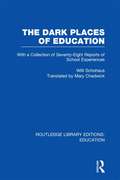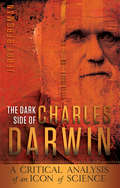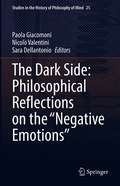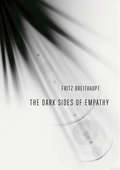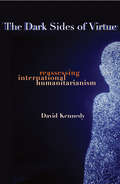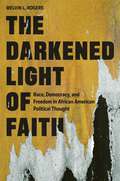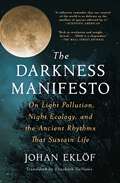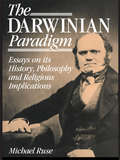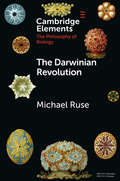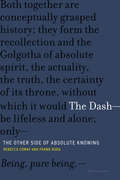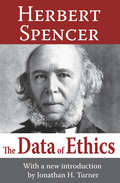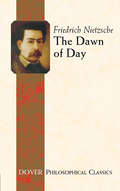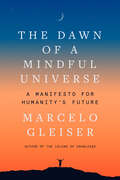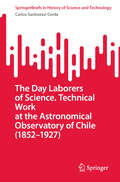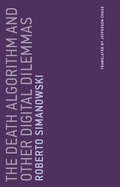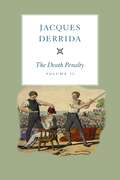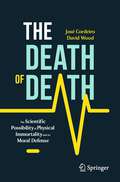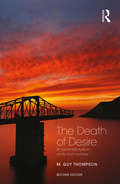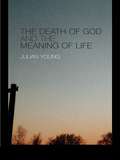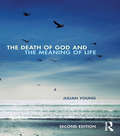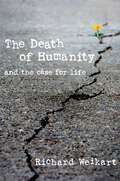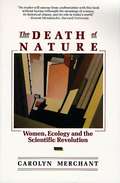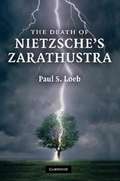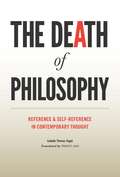- Table View
- List View
The Dark Places of Education: With a Collection of Seventy-Eight Reports of School Experiences (Routledge Library Editions: Education)
by Willi SchohausThe book is divided into two parts. The first forms a survey of the inadequacies of the Swiss school system in the early twentieth century (but the issues it discusses were universal ones which were just as prevalent in the English school system of that time). The second part of the book is a collection of testimonies from former pupils on the worst aspects of their schooling. With reference to the ideals of Pestalozzi the author proposes ways in which to find constructive solutions to the problems of harsh teachers, schools and de-motivated pupils.
The Dark Side of Charles Darwin: A Critical Analysis of an Icon of Science
by Dr Jerry BergmanA single man stands behind the greatest deception in history. Charles Darwin's ideas still penetrate every aspect of our culture, including science, religion, and education. And while much has been made of his contribution to the evolutionary hypothesis, little has been publicized about the dark side of the man himself and how this may have impacted the quality and legitimacy of his research. This daring and compelling book takes its readers behind the popular facade of a man revered worldwide as a scientific pioneer, and unveils what kind of person Darwin really was. The book reveals disturbing facts that will help you: Perceive Darwin firsthand through the eyes of family and friends, and his own correspondence Discern this darkly troubled man, struggling with physical and mental health issues Uncover his views on eugenics and racism, and his belief that women were less evolved than men Thoroughly documented, this book reveals Darwin's less-than-above board methods of attempting to prove his so-called scientific beliefs, and his plot to "murder God" by challenging the then-dominant biblical worldview.
The Dark Side: Philosophical Reflections on the “Negative Emotions” (Studies in the History of Philosophy of Mind #25)
by Sara Dellantonio Paola Giacomoni Nicolò ValentiniThis book takes the reader on a philosophical quest to understand the dark side of emotions. The chapters are devoted to the analysis of negative emotions and are organized in a historical manner, spanning the period from ancient Greece to the present time. Each chapter addresses analytical questions about specific emotions generally considered to be unfavorable and classified as negative. The general aim of the volume is to describe the polymorphous and context-sensitive nature of negative emotions as well as changes in the ways people have interpreted these emotions across different epochs. The editors speak of ‘the dark side of the emotions’ because their goal is to capture the ambivalent – unstable and shadowy – aspects of emotions. A number of studies have taken the categorial distinction between positive and negative emotions for granted, suggesting that negative emotions are especially significant for our psychological experience because they signal difficult situations. For this reason, the editors stress the importance of raising analytical questions about the valence of particular emotions and focussing on the features that make these emotions ambivalent: how – despite their negativity – such emotions may turn out to be positive. This opens up a perspective in which each emotion can be understood as a complex interlacing of negative and positive properties. The collection presents a thoughtful dialogue between philosophy and contemporary scientific research. It offers the reader insight by illuminating the dark side of the emotions.
The Dark Sides of Empathy
by Fritz BreithauptMany consider empathy to be the basis of moral action. However, the ability to empathize with others is also a prerequisite for deliberate acts of humiliation and cruelty. In The Dark Sides of Empathy, Fritz Breithaupt contends that people often commit atrocities not out of a failure of empathy but rather as a direct consequence of over-identification and a desire to increase empathy. Even well-meaning compassion can have many unintended consequences, such as intensifying conflicts or exploiting others.Empathy plays a central part in a variety of highly problematic behaviors. From mere callousness to terrorism, exploitation to sadism, and emotional vampirism to stalking, empathy all too often motivates and promotes malicious acts. After tracing the development of empathy as an idea in German philosophy, Breithaupt looks at a wide-ranging series of case studies—from Stockholm syndrome to Angela Merkel's refugee policy and from novels of the romantic era to helicopter parents and murderous cheerleader moms—to uncover how narcissism, sadism, and dangerous celebrity obsessions alike find their roots in the quality that, arguably, most makes us human.
The Dark Sides of Virtue: Reassessing International Humanitarianism
by David KennedyIn this provocative and timely book, David Kennedy explores what can go awry when we put our humanitarian yearnings into action on a global scale--and what we can do in response. Rooted in Kennedy's own experience in numerous humanitarian efforts, the book examines campaigns for human rights, refugee protection, economic development, and for humanitarian limits to the conduct of war. It takes us from the jails of Uruguay to the corridors of the United Nations, from the founding of a non-governmental organization dedicated to the liberation of East Timor to work aboard an aircraft carrier in the Persian Gulf. Kennedy shares the satisfactions of international humanitarian engagement--but also the disappointments of a faith betrayed. With humanitarianism's new power comes knowledge that even the most well-intentioned projects can create as many problems as they solve. Kennedy develops a checklist of the unforeseen consequences, blind spots, and biases of humanitarian work--from focusing too much on rules and too little on results to the ambiguities of waging war in the name of human rights. He explores the mix of altruism, self-doubt, self-congratulation, and simple disorientation that accompany efforts to bring humanitarian commitments to foreign settings. Writing for all those who wish that "globalization" could be more humane, Kennedy urges us to think and work more pragmatically. A work of unusual verve, honesty, and insight, this insider's account urges us to embrace the freedom and the responsibility that come with a deeper awareness of the dark sides of humanitarian governance.
The Darkened Light of Faith: Race, Democracy, and Freedom in African American Political Thought
by Melvin L. RogersA powerful new account of what a group of nineteenth- and twentieth-century African American activists, intellectuals, and artists can teach us about democracyCould the African American political tradition save American democracy? African Americans have had every reason to reject America’s democratic experiment. Yet African American activists, intellectuals, and artists who have sought to transform the United States into a racially just society have put forward some of the most original and powerful ideas about how to make America live up to its democratic ideals. In The Darkened Light of Faith, Melvin Rogers provides a bold new account of African American political thought through the works and lives of individuals who built this vital tradition—a tradition that is urgently needed today.The book reexamines how figures as diverse as David Walker, Frederick Douglass, Anna Julia Cooper, Ida B. Wells, W.E.B. Du Bois, Billie Holiday, and James Baldwin thought about the politics, people, character, and culture of a society that so often dominated them. Sharing a light of faith darkened but not extinguished by the tragic legacy of slavery, they resisted the conclusion that America would always be committed to white supremacy. They believed that democracy is always in the process of becoming and that they could use it to reimagine society. But they also saw that achieving racial justice wouldn’t absolve us of the darkest features of our shared past, and that democracy must be measured by how skillfully we confront a history that will forever remain with us.An ambitious account of the profound ways African Americans have reimagined democracy, The Darkened Light of Faith offers invaluable lessons about how to grapple with racial injustice and make democracy work.
The Darkness Manifesto: On Light Pollution, Night Ecology, and the Ancient Rhythms that Sustain Life
by Johan EklöfIn the bestselling tradition of Why We Sleep and The Sixth Extinction, an urgent and insightful look at the hidden impact of light pollution, and a passionate appeal to cherish natural darkness for the sake of the environment, our own well-being, and all life on earth.How much light is too much light? Satellite pictures show our planet as a brightly glowing orb, and in our era of constant illumination, light pollution has become a major issue. The world&’s flora and fauna have evolved to operate in the natural cycle of day and night. But in the last 150 years, we have extended our day—and in doing so have forced out the inhabitants of the night and disrupted the circadian rhythms necessary to sustain all living things, including ourselves. In this persuasive, well-researched book, Swedish conservationist Johan Eklöf urges us to appreciate natural darkness, its creatures, and its unique benefits. Eklöf ponders the beauties of the night sky, traces the errant paths of light-drunk moths and the swift dives of keen-eyed owls, and shows us the bioluminescent creatures of the deepest oceans. As a devoted friend of the night, he writes passionately about the startling damage we inflict on ourselves and our fellow creatures simply by keeping the lights on. The Darkness Manifesto depicts the domino effect of diminishing darkness: insects, dumbfounded by streetlamps, failing to reproduce; birds blinded and bewildered by artificial lights; and bats starving as they wait in vain for food insects that only come out in the dark of night. For humans, light-induced sleep disturbances impact our hormones and weight, and can contribute to mental health problems like chronic stress and depression. The streetlamps, floodlights, and neon signs of cities are altering entire ecosystems, and scientists are only just beginning to understand the long-term effects. The light bulb—long the symbol of progress and development—needs to be turned off. Educational, eye-opening, and ultimately encouraging, The Darkness Manifesto outlines simple steps that we can take to benefit ourselves and the planet. In order to ensure a bright future, we must embrace the darkness.
The Darwinian Paradigm: Essays On Its History, Philosophy, And Religious Implications
by Michael RuseFirst published in 1989. Routledge is an imprint of Taylor & Francis, an informa company.
The Darwinian Revolution (Elements in the Philosophy of Biology)
by Michael RuseWhat is the Darwinian revolution and why is it important for philosophers? These are the questions tackled in this Element. In four sections, the topics covered are the story of the revolution, the question of whether it really was a revolution, the nature of the revolution, and the implications for philosophy, both epistemology and ethics.
The Dash: The Other Side of Absolute Knowing (Short Circuits)
by Rebecca Comay Frank RudaAn argument that what is usually dismissed as the “mystical shell” of Hegel's thought—the concept of absolute knowledge—is actually its most “rational kernel.” This book sets out from a counterintuitive premise: the “mystical shell” of Hegel's system proves to be its most “rational kernel.” Hegel's radicalism is located precisely at the point where his thought seems to regress most. Most current readings try to update Hegel's thought by pruning back his grandiose claims to “absolute knowing.” Comay and Ruda invert this deflationary gesture by inflating what seems to be most trivial: the absolute is grasped only in the minutiae of its most mundane appearances. Reading Hegel without presupposition, without eliminating anything in advance or making any decision about what is essential and what is inessential, what is living and what is dead, they explore his presentation of the absolute to the letter.The Dash is organized around a pair of seemingly innocuous details. Hegel punctuates strangely. He ends the Phenomenology of Spirit with a dash, and he begins the Science of Logic with a dash. This distinctive punctuation reveals an ambiguity at the heart of absolute knowing. The dash combines hesitation and acceleration. Its orientation is simultaneously retrospective and prospective. It both holds back and propels. It severs and connects. It demurs and insists. It interrupts and prolongs. It generates nonsequiturs and produces explanations. It leads in all directions: continuation, deviation, meaningless termination. This challenges every cliché about the Hegelian dialectic as a machine of uninterrupted teleological progress. The dialectical movement is, rather, structured by intermittency, interruption, hesitation, blockage, abruption, and random, unpredictable change—a rhythm that displays all the vicissitudes of the Freudian drive.
The Data of Ethics
by Herbert SpencerIn this amazingly prophetic work, done late in his career, Herbert Spencer offers an approach to ethics that anticipates developments throughout the twentieth century. He moves away from the twin evils of ethical doctrines bequeathed to us by an ancient past that are simply no longer feasible but also avoids modern standards of ethical conduct that are simply impossible to attain. "By association with rules that cannot be obeyed," Spencer writes, "rules that can be obeyed lose their authority."The volume opens with three chapters on conduct: its evolution, good and bad, and ways of judgment. This is followed by a series of chapters that examine ethics from a variety of scientific perspectives: physics, biology, psychology, and sociology. The work then moves on to specific issues of deep human concern: the relativity of pleasures and pain, egoism versus altruism in explaining actions, and trial and compromise in decision-making about ethical concerns.Spencer's work anticipates the movement toward pragmatic, naturalistic, and even positivist approaches to ethics. He emphasizes that a relativist approach while in keeping with the spirit of the industrial age, also poses a variety of problems that admit only of empirical solutions. He understands that his critical stance on absolutism should not blind researchers to the ideals assumed by the ancients that assist people in their everyday living. In short, this is a remarkable work, entirely modern, and yet containing a sharp evaluation of how ethical data serve to enhance ethical conduct.
The Dawn of Day
by Friedrich Nietzsche J. M. KennedyOne of the most important philosophers of the nineteenth century, Friedrich Nietzsche's influence on modern thought has extended beyond the borders of philosophy. His works have helped shape modern anthropology, psychology, theology, and sociology. Poets, novelists, and artists have also been touched by Nietzsche's powerful concepts and perspectives.Edited by a noted Nietzsche scholar, this authoritative compendium is a vital assembly of nearly all of Nietzsche's early works. Marking the advent of his mature philosophy, these aphorisms and prose poems examine the impulses that lead human beings to seek the comforts of religion, morality, metaphysics, and art. Nietzsche proposes greater individualism and personality development, addresses issues of society and family, and discusses visions of free spirits with the courage to be rid of idealist prejudices. Written in his distinctive, often paradoxical style, The Dawn of Day presents practically every theme touched upon in Nietzsche's later philosophical essays. It is an essential guide and a fundamental basis for the understanding of the great philosopher and his work.
The Dawn of a Mindful Universe: A Manifesto for Humanity's Future
by Marcelo GleiserAn award-winning astronomer and physicist’s spellbinding and urgent call for a new Enlightenment and the recognition of the preciousness of life using reason and curiosity—the foundations of science—to study, nurture, and ultimately preserve humanity as we face the existential crisis of climate change. Since Copernicus, humanity has increasingly seen itself as adrift, an insignificant speck within a large, cold universe. Brazilian physicist, astronomer, and winner of the 2019 Templeton Prize Marcelo Gleiser argues that it is because we have lost the spark of the Enlightenment that has guided human development over the past several centuries. While some scientific efforts have been made to overcome this increasingly bleak perspective—the ongoing search for life on other planets, the recent idea of the multiverse—they have not been enough to overcome the core problem: we’ve lost our moral mission and compassionate focus in our scientific endeavors.Gleiser argues that we’re using the wrong paradigm to relate to the universe and our position in it. In this deeply researched and beautifully rendered book, he calls for us to embrace a new life-centric perspective, one which recognizes just how rare and precious life is and why it should be our mission to preserve and nurture it. The Dawn of a Mindful Universe addresses the current environmental and scientific impasses and how the scientific community can find solutions to them.Gleiser’s paradigm rethinks the ideals of the Enlightenment, and proposes a new direction for humanity, one driven by human reason and curiosity whose purpose is to save civilization itself. Within this model, we can once again see ourselves as the center of the universe—the place where life becomes conscious—and regain a clear moral compass which can be used to guide both science and the politics around it.
The Day Laborers of Science. Technical Work at the Astronomical Observatory of Chile (SpringerBriefs in History of Science and Technology)
by Carlos Sanhueza-CerdaThis book fills a significant gap in the historiography of science by examining the overlooked contributions of non-astronomical personnel in the early National Astronomical Observatory of Chile. Drawing upon David Edgerton's critique of the bias towards academic scientists in historical narratives, this research delves into the roles of other scientists, technicians, collaborators, and other support staff in shaping scientific endeavors. The book analyzes archival documents and reveals the essential yet often unacknowledged labor involved in routine scientific tasks. By challenging the hierarchical structure of observatory organizations and spotlighting the significance of routine work, the book redefines the production of scientific knowledge beyond the conventional focus on eminent scientists. Emphasizing the importance of failures, conflicts, and controversies, this book unveils the hidden narratives of everyday scientific labor, offering a more comprehensive understanding of the history of astronomy in Chile.
The Death Algorithm and Other Digital Dilemmas (Untimely Meditations #14)
by Roberto SimanowskiProvocative takes on cyberbullshit, smartphone zombies, instant gratification, the traffic school of the information highway, and other philosophical concerns of the Internet age. In The Death Algorithm and Other Digital Dilemmas, Roberto Simanowski wonders if we are on the brink of a society that views social, political, and ethical challenges as technological problems that can be fixed with the right algorithm, the best data, or the fastest computer. For example, the “death algorithm ” is programmed into a driverless car to decide, in an emergency, whether to plow into a group of pedestrians, a mother and child, or a brick wall. Can such life-and-death decisions no longer be left to the individual human? In these incisive essays, Simanowski asks us to consider what it means to be living in a time when the president of the United States declares the mainstream media to be an enemy of the people—while Facebook transforms the people into the enemy of mainstream media. Simanowski describes smartphone zombies (or “smombies”) who remove themselves from the physical world to the parallel universe of social media networks; calls on Adorno to help parse Trump's tweeting; considers transmedia cannibalism, as written text is transformed into a postliterate object; compares the economic and social effects of the sharing economy to a sixteen-wheeler running over a plastic bottle on the road; and explains why philosophy mat become the most important element in the automotive and technology industries.
The Death Penalty, Volume II
by Jacques Derrida Elizabeth RottenbergIn the first volume of his extraordinary analysis of the death penalty, Jacques Derrida began a journey toward an ambitious end: the first truly philosophical argument against the death penalty. Exploring an impressive breadth of thought, he traced a deeply entrenched logic throughout the whole of Western philosophy that has justified the state’s right to take a life. He also marked literature as a crucial place where this logic has been most effectively challenged. In this second and final volume, Derrida builds on these analyses toward a definitive argument against capital punishment. Of central importance in this second volume is Kant’s explicit justification of the death penalty in the Metaphysics of Morals. Thoroughly deconstructing Kant’s position—which holds the death penalty as exemplary of the eye-for-an-eye Talionic law—Derrida exposes numerous damning contradictions and exceptions. Keeping the current death penalty in the United States in view, he further explores the “anesthesial logic” he analyzed in volume one, addressing the themes of cruelty and pain through texts by Robespierre and Freud, reading Heidegger, and—in a fascinating, improvised final session—the nineteenth-century Spanish Catholic thinker Donoso Cortés. Ultimately, Derrida shows that the rationality of the death penalty as represented by Kant involves an imposition of knowledge and calculability on a fundamental condition of non-knowledge—that we don’t otherwise know what or when our deaths will be. In this way, the death penalty acts out a phantasm of mastery over one’s own death. Derrida’s thoughts arrive at a particular moment in history: when the death penalty in the United States is the closest it has ever been to abolition, and yet when the arguments on all sides are as confused as ever. His powerful analysis will prove to be a paramount contribution to this debate as well as a lasting entry in his celebrated oeuvre.
The Death of Death: The Scientific Possibility of Physical Immortality and its Moral Defense (Copernicus Books)
by David Wood José CordeiroIs death inevitable? Until now, the history of mankind has been marked by this fatal fact. Religions, borders and progress are born from an ancient fear of death, comfort from this fear man often found only in religious paradigms. But according to José Luis Cordeiro and David Wood, the incontrovertible fact of death is no longer an absolute certainty - science and technology are preparing to tear down the final frontier: that of immortality.This accessible book provides insight into recent exponential advances in artificial intelligence, tissue regeneration, stem cell treatment, organ printing, cryopreservation, and genetic therapies that, for the first time in human history, offer a realistic chance to solve the problem of the aging of the human body. In this book, Cordeiro and Wood not only present all the major developments, initiatives, and ideas for eternal life, they also show why there are a number of good arguments for seeing death for what it is: the last undefeated disease.Enter any drugstore or bookstore, and we confronted with a mountain of nonsense concerning the aging process. Society seems obsessed with aging. That is why The Death of Death is such a refreshing delight, able to cut through the hype and reveal a balanced, authoritative, and lucid discussion of this controversial topic. It summarizes the astonishing breakthroughs made recently in revealing how science may one day conquer the aging process.Michio Kaku, theoretical physicist and author of The God Equation: The Quest for a Theory of Everything We are entering a Fantastic Voyage into life extension, crossing different bridges that will take us to indefinite life spans. The Death of Death explains clearly how we might soon reach longevity escape velocity and live long enough to live forever. Ray Kurzweil, co-author of Fantastic Voyage: Live Long Enough to Live Forever and co-founder of Singularity University The Death of Death is a truly revolutionary book. This is a visionary book that confronts us with the terrible reality of aging, and its authors are friends and connoisseurs of the subject. I believe that the authoritative and exhaustive description of this crusade that José and David make in this excellent book will accelerate this process. Forward! Aubrey de Grey, founder of LEV (Longevity Escape Velocity) Foundation and co-author of Ending Aging
The Death of Desire: An Existential Study in Sanity and Madness
by M. Guy ThompsonA stunning exploration of the relation between desire and psychopathology, The Death of Desire is a unique synthesis of the work of Laing, Freud, Nietzsche, and Heidegger that renders their often difficult concepts brilliantly accessible to and usable by psychotherapists of all persuasions. In bridging a critical gap between phenomenology and psychoanalysis, M. Guy Thompson, one of the leading existential psychoanalysts of our time, firmly re-situates the unconscious – what Freud called "the lost continent of repressed desires" – in phenomenology. In so doing, he provides us with the richest, most compelling phenomenological treatment of the unconscious to date and also makes Freud’s theory of the unconscious newly comprehensible. In this revised and updated second edition to the original published in 1985, M. Guy Thompson takes us inside his soul-searching seven-year apprenticeship with radical psychiatrist R. D. Laing and his cohorts as it unfolded in counterculture London of the 1970s. This rite de passage culminates with a four-year sojourn inside one of Laing’s post-Kingsley Hall asylums, where Laing’s unorthodox conception of treatment dispenses with conventional boundaries between "doctor" and "patient." In this unprecedented exploration, Thompson reveals the secret to Laing’s astonishing alternative to the conventional psychiatric and psychoanalytic treatment schemes. Movingly written and deeply personal, Thompson shows why the very concept of "mental illness" is a misnomer and why sanity and madness should be understood instead as inherently puzzling stratagems that we devise in order to protect ourselves from intolerable mental anguish. The Death of Desire offers a provocative and challenging reappraisal of depth psychotherapy from an existential perspective that will be of interest to psychoanalysts, psychotherapists, philosophers, social scientists, and students of the human condition.
The Death of God and the Meaning of Life
by Julian YoungWhat is the meaning of life? In the post-modern, post-religious scientific world, this question is becoming a preoccupation. But it also has a long history: many major figures in philosophy had something to say on the subject, as Julian Young so vividly illustrates in this thought-provoking book. Part One of the book presents an historical overview of philosophers from Plato to Hegel and Marx who have believed in some sort of meaning of life, either in some supposed 'other' world or in the future of this world. Part Two looks at what happened when the traditional structures that provided life with meaning ceased to be believed. With nothing to take their place, these structures gave way to the threat of nihilism, to the appearance that life is meaningless. Julian Young looks at the responses to this threat in the work of Nietzsche, Heidegger, Sartre, Camus, Foucault and Derrida. This compelling and highly engaging exploration of fundamental values will captivate anyone who's ever asked themselves where life's meaning (if there is one) really lies. It also makes a perfect historical introduction to philosophy.
The Death of God and the Meaning of Life
by Julian YoungWhat is the meaning of life? In today's secular, post-religious scientific world, this question has become a serious preoccupation. But it also has a long history: many major philosophers have thought deeply about it, as Julian Young so vividly illustrates in this thought-provoking second edition of The Death of God and the Meaning of Life. Three new chapters explore Søren Kierkegaard’s attempts to preserve a Christian answer to the question of the meaning of life, Karl Marx's attempt to translate this answer into naturalistic and atheistic terms, and Sigmund Freud’s deep pessimism about the possibility of any version of such an answer. Part 1 presents an historical overview of philosophers from Plato to Marx who have believed in a meaning of life, either in some supposed ‘other’ world or in the future of this world. Part 2 assesses what happened when the traditional structures that give life meaning began to erode. With nothing to take their place, these structures gave way to the threat of nihilism, to the appearance that life is meaningless. Young looks at the responses to this threat in chapters on Nietzsche, Heidegger, Sartre, Camus, Foucault and Derrida. Fully revised and updated throughout, this highly engaging exploration of fundamental issues will captivate anyone who’s ever asked themselves where life’s meaning (if there is one) really lies. It also makes a perfect historical introduction to philosophy, particularly to the continental tradition.
The Death of Humanity: and the Case for Life
by Richard WeikartDo you believe human life is inherently valuable? Unfortunately, in the secularized age of state-sanctioned euthanasia and abortion-on-demand, many are losing faith in the simple value of human life. To the disillusioned, human beings are a cosmic accident whose intrinsic value is worth no more than other animals.The Death of Humanity explores our culture's declining respect for the sanctity of human life, drawing on philosophy and history to reveal the dark road ahead for society if we lose our faith in human life.
The Death of Nature: Women, Ecology and the Scientific Revolution
by Carolyn MerchantHow the scientific revolution sanctioned the exploitation of nature, commercial expansion, and the subjugation of women.
The Death of Nietzsche's Zarathustra
by Paul S. LoebIn this study of Nietzsche's Thus Spoke Zarathustra, Paul S. Loeb proposes a new account of the relation between the book's literary and philosophical aspects and argues that the book's narrative is designed to embody and exhibit the truth of eternal recurrence. Loeb shows how Nietzsche constructed a unified and complete plot in which the protagonist dies, experiences a deathbed revelation of his endlessly repeating life, and then returns to his identical life so as to recollect this revelation and gain a power over time that advances him beyond the human. Through close textual analysis and careful attention to Nietzsche's use of Platonic, Biblical, and Wagnerian themes, Loeb explains how this novel design is the key to solving the many riddles of Thus Spoke Zarathustra - including its controversial fourth part, its obscure concept of the Übermensch, and its relation to Nietzsche's Genealogy of Morals.
The Death of Philosophy: Reference and Self-reference in Contemporary Thought
by Isabelle Thomas-Fogiel Richard A. LynchPhilosophers debate the death of philosophy as much as they debate the death of God. Kant claimed responsibility for both philosophy's beginning and end, while Heidegger argued it concluded with Nietzsche. In the twentieth century, figures as diverse as John Austin and Richard Rorty have proclaimed philosophy's end, with some even calling for the advent of "postphilosophy." In an effort to make sense of these conflicting positions--which often say as much about the philosopher as his subject--Isabelle Thomas-Fogiel undertakes the first systematic treatment of "the end of philosophy," while also recasting the history of western thought itself.Thomas-Fogiel begins with postphilosophical claims such as scientism, which she reveals to be self-refuting, for they subsume philosophy into the branches of the natural sciences. She discovers similar issues in Rorty's skepticism and strands of continental thought. Revisiting the work of late-nineteenth and early-twentieth-century philosophers, when the split between analytical and continental philosophy began, Thomas-Fogiel finds both traditions followed the same path--the road of reference--which ultimately led to self-contradiction. This phenomenon, whether valorized or condemned, has been understood as the death of philosophy. Tracing this pattern from Quine to Rorty, from Heidegger to Levinas and Habermas, Thomas-Fogiel reveals the self-contradiction at the core of their claims while also carving an alternative path through self-reference. Trained under the French philosopher Bernard Bourgeois, she remakes philosophy in exciting new ways for the twenty-first century.
The Death of Philosophy: Reference and Self-reference in Contemporary Thought
by Isabelle Thomas-FogielPhilosophers debate the death of philosophy as much as they debate the death of God. Kant claimed responsibility for both philosophy's beginning and end, while Heidegger argued it concluded with Nietzsche. In the twentieth century, figures as diverse as John Austin and Richard Rorty have proclaimed philosophy's end, with some even calling for the advent of "postphilosophy." In an effort to make sense of these conflicting positions-which often say as much about the philosopher as his subject-Isabelle Thomas-Fogiel undertakes the first systematic treatment of "the end of philosophy," while also recasting the history of western thought itself.Thomas-Fogiel begins with postphilosophical claims such as scientism, which she reveals to be self-refuting, for they subsume philosophy into the branches of the natural sciences. She discovers similar issues in Rorty's skepticism and strands of continental thought. Revisiting the work of late-nineteenth and early-twentieth-century philosophers, when the split between analytical and continental philosophy began, Thomas-Fogiel finds both traditions followed the same path-the road of reference-which ultimately led to self-contradiction. This phenomenon, whether valorized or condemned, has been understood as the death of philosophy. Tracing this pattern from Quine to Rorty, from Heidegger to Levinas and Habermas, Thomas-Fogiel reveals the self-contradiction at the core of their claims while also carving an alternative path through self-reference. Trained under the French philosopher Bernard Bourgeois, she remakes philosophy in exciting new ways for the twenty-first century.
